
Barricades put up to prevent protestors from proceeding past the designated protest area at Jantar Mantar in New Delhi. April 9, 2017.
Chalo Dilli / Onward to Delhi
Jantar Mantar is where India gathers to speak out. A 500-meter section of road, which borrows its name from an adjacent 18th-century astronomical observatory, is Delhi’s designated protest site. Each year, the site draws thousands of protesters from across the country.
Some seek justice for themselves. Others come in solidarity with strangers. Many oppose government policies they believe are unjust.
For some, the footpaths become a long-term home. Tents made from protest banners shelter those who refuse to leave until justice is served. Others travel for days to be here for just a few hours. It is often their first and only visit to the capital.
This project documents three years of resistance at Jantar Mantar through a series of over 100 portraits and interviews. It traces the quiet power of gathering, the culture of dissent, and the endurance of democratic voice in a time of rising authoritarianism and crackdown on civil liberties.
The work has appeared in The Indian Quarterly and was a finalist at the Verzasca Foto Festival Awards in 2020.
It was part of the artist-architect Sofia Karim’s Turbinebagh project and is included in the permanent collection of the Victoria and Albert Museum, London. It was also exhibited at the Indian Photo Festival in Hyderabad, India, Round Them Oranges in Jaipur, and Leeds City Museum, UK.

Santosh ‘Murat’ Singh (35)
Chittauni, Varanasi, Uttar Pradesh.
In the year 2000, Singh met a Bollywood actor shooting near his village and went on to join his personal staff in Mumbai. He fell in love with a Maharashtrian Dalit girl and married her, which led to a social boycott in the village in 2003. Six months later, his relatives gave an affidavit to the local authorities stating that he had died in a bomb blast. They performed his final rites and took possession of his 12.5-acre patch of land. He has been fighting ever since, holding a placard that says ‘I’m still alive’. October 26, 2016.

Kandaswamy Ramalingam (36)
Katayambatti, Tiruchirapalli, Tamil Nadu.
For close to six weeks, a 100-odd farmers from Tamil Nadu sat on protest at Jantar Mantar in New Delhi, demanding drought relief funds, waiver of farm loans and the setting up of a Cauvery Management Board. They made headlines for using bizarre props like skulls–which they claimed were of farmers who had killed themselves because of mounting debt–and theatrical acts, including shaving off half their beards and moustaches, drinking urine, cutting their palms, and eating mice. When the Prime Minister couldn’t find the time to meet them, they stripped naked in front of his office. Many suffered different degrees of heatstroke, and some were forcibly sent back by their leaders after their health began to fail. April 9, 2017.

Gajadhar Singh (58) and Ranju Devi (45)
Jihuli, East Champaran, Bihar.
Frustrated with the current political dispensation, Singh and Devi hope to become the Prime Minister of India and the Chief Minister of Bihar, respectively, to bring about change. April 9, 2017.

Sandeep Anand (33)
Delhi.
Anand, who sells wallets at Sarojini Market in Delhi, winds up after selling 15-16–just enough for his daily bread–and heads over to Jantar Mantar. The horrific gangrape in December 2012 in Delhi of a 23-year-old victim referred to as ‘Nirbhaya’ shook him to the core. He has been demonstrating every day since, demanding stricter laws and punishments that deter rape and other atrocities against women. January 21, 2017.

Shivlal Tatdhari (65)
Kuloth Khurd, Jhunjhunu, Rajasthan.
Tatdhari, who retired from Hindustan Copper Limited, is a staunch follower of the Indian freedom fighter ‘Netaji’ Subhash Chandra Bose. Bose had disappeared under mysterious circumstances in 1945 and is believed to have been killed in a plane crash in Taiwan. Tatdhari, however, believes he is still alive and wants the Indian government to investigate and make the facts of his disappearance public. He travels to Jantar Mantar every couple of months to stage a sit-in. April 9, 2017.

Vrishali Shruti (23)
Kurukshetra, Haryana.
Associated with the Disha Chhatra Sangathan, Shruti attended a protest by Bigul Mazdoor Dasta against a court verdict that had convicted 31 employees of car manufacturer Maruti Suzuki, including 13 on charges of murder of an HR manager. Violence erupted at the company’s Manesar plant on July 18, 2012, following disciplinary action against an employee, resulting in a casualty and injuries to 100. April 7, 2017.
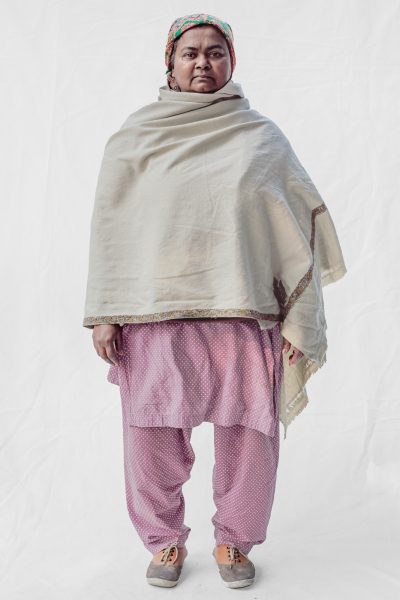
Mehrunnisa (46)
Delhi.
A palliative care nurse who was about to take up a job in Saudi Arabia, Mehrunnisa, happened to watch a news item on malnourished children in Nigeria and Myanmar. Shocked that children were dying of hunger in this day and age, she decided to come to Jantar Mantar to demand that the Indian government take positive action to help them.
She had later joined the dadis at the Shaheen Bagh protest site in Delhi, demanding the rollback of the controversial citizenship acts. January 22, 2017.


Noida, Uttar Pradesh.
Khan has been working on a contract basis at a nursery operated by the Noida Development Authority for the past 25 years. She came with her colleagues demanding regularisation of services, an ID card, salary hike, health benefits and provident fund. October 26, 2016.

Ghaziabad, Uttar Pradesh.
Ojha, who retired from Indian Oil, is associated with the Bharatiya Gauraksha Kranti, which demands a complete ban on cow slaughter in India and allocation of 5% of available common land in every village for cattle-grazing purposes. He used to bring some cows along with him to the protest site earlier, but the municipal authorities would move them to a cow shelter, and Ojha was arrested by the police for obstructing them. Once released from the police station the next morning, Ojha would proceed to get his cows released and head once again to Jantar Mantar. The cycle continued for many days, but Ojha eventually got tired of it and walks alone to the site now. January 21, 2017.

Nilanga, Latur, Maharashtra.
Suryavanshi says he launched his ‘Akhil Bharatiya Joota Maaro Andolan’ in 2006 after revenue officials demanded a bribe to regularise his land records. He has been living at Jantar Mantar ever since, helping people to write petitions to concerned officials, with an added threat to hit them with shoes if they don’t solve the problem. April 8, 2017.

Delhi.
Both Tamil-speaking domestic workers in Delhi, demanded further categorisation of Scheduled Castes into groups in accordance with each group’s relative backwardness and proportion of population. April 7, 2017.

Chennai, Tamil Nadu.
Kalaiselvi, who goes by a single name, was part of a protest called for by the National Mazdoor Panchayat Sangam, against the central government’s proposal to merge 44 labour statutes into four labour codes. The protestors say this could lead to either the deletion or substantial dilution of fundamental trade union rights, benefits and facilities, including Safety, Health and Social Security. December 2, 2019.

Bihdubi, Nagaon, Assam.
Mukhia, who worked at a sawmill and later as a driver, claims a neighbour burnt his house down in 2007 when he was away visiting his daughter. As none of his other neighbours were ready to testify against the person, Mukhia is now in Delhi pleading for help. He wants the government, which could not give him justice, to provide him with shelter, food and his kids’ education. January 22, 2017.
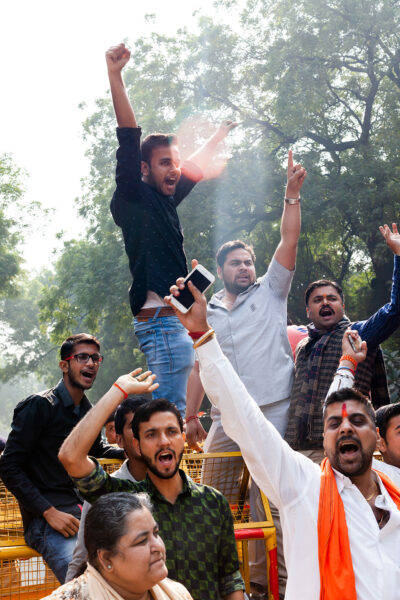
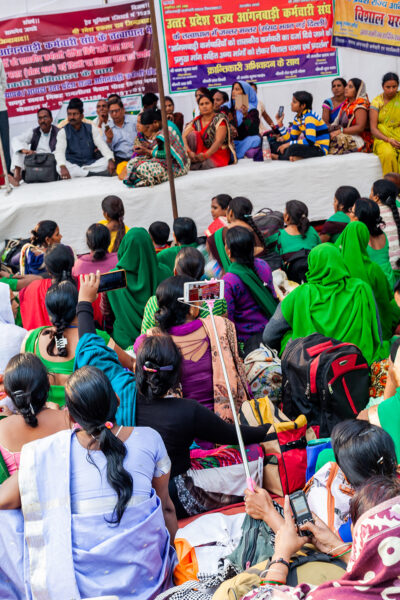

Didihat, Pithoragarh, Uttarakhand.
Janpangi, a former constable with the Indo-Tibetan Border Police, claims to have quit his job to fight corruption. He says he fights for the rights of the Raji tribe, a Particularly Vulnerable Tribal group of whom only 690 remain as per the 2011 census. Janpangi had been living at Jantar Mantar since 2011, trying to secure justice for two tribal youth who were tried as adults for a crime despite being minors.
April 8, 2017.

Delhi.
Saxena joined the Delhi Police as a home guard in 1986, but was removed overnight along with many others in the year 2000. Home guards unceremoniously terminated from service between 1991 and 2001 were appealing to the government to reinstate them and to guarantee employment till the age of 60. December 1, 2019.

Lakhisarai, Bihar.
Kumar, who holds a PhD in literature from Delhi University, has been on a hunger strike periodically for 23 years now, usually for 24-48 hours, hoping to change the system and to build a new socialist polity that cares for the poor and the oppressed. November 29, 2019.

Delhi.
Sharma, a former teacher, demanded an enquiry to probe the suspicious death of Rajiv Dixit, an aide of the Yoga guru and co-owner of the Patanjali Ayurveda brand, Baba Ramdev, on 30 November 2010. Dixit founded the Azadi Bachao Andolan (Save Freedom Movement) in the 90s to protect Indian companies from the threat of globalisation, and was also the national secretary to Bharat Swabhiman Andolan, an organisation founded by Ramdev to fight corruption and promote indigenous industry. November 30, 2019.

Delhi.
A student of pharmacy, Bindiya, who goes by one name, joined pharmacists from across the country in opposing the changes proposed under the Drugs and Cosmetics Rules, 1945, which will allow community health workers, accredited social health activists, nurses and midwives to prescribe drugs. November 29, 2019.

Gurgaon, Haryana.
Col. Dabas came in support of other members of the armed forces who have been protesting at Jantar Mantar, demanding the implementation of ‘One Rank, One Pension’– same pension, for same rank, for same length of service, irrespective of the date of retirement. January 22, 2017.

Doda, Jammu and Kashmir.
Kumar was once turned away from a government job by an officer who told him to go farming. Over the next 40 years, he planted over 530000 saplings, an effort that was recognised by the state government and awarded. Kumar, however, claims his efforts to take up human rights abuse cases led to targeted harassment from local police. While at Jantar Mantar, he pulls out nails from trees in the vicinity. January 22, 2017.

Delhi.
A Kashmiri Pandit who had been forced to leave the valley, Kaul was at Jantar Mantar on the anniversary of the signing of the Instrument of Accession by Maharaja Hari Singh, to demand home rule in Kashmir without Article 370. She wants to move back to Kashmir with ‘One Flag, One Rule.’ October 27, 2016.

Seoni, Madhya Pradesh.
The Nandans own a battery manufacturing unit, but a trademark has been denied to them as the name resembles that of a well-established battery manufacturer. They hoped to convince the Office of the Registrar of Trademarks in Mumbai to issue a trademark. December 2, 2019.

Khettapatti, Azamgarh, Uttar Pradesh.
Singh injured his foot at a stone crusher where he was employed in Mirzapur, but was denied free healthcare as he was a contract employee. Unable to afford surgery, he chose to protest in Delhi instead. Walking about with a plastered foot, he raised slogans against the state government all day through a megaphone that he had bought for the purpose. February 12, 2017.

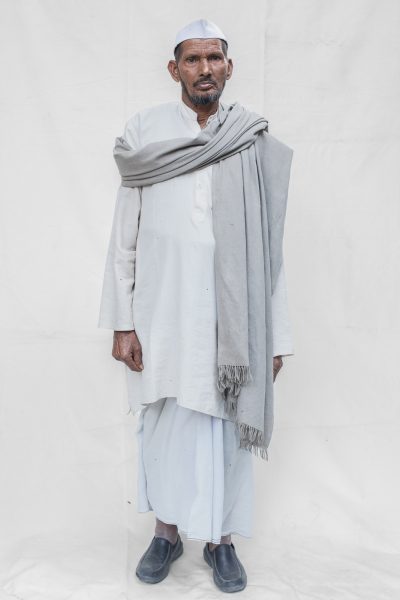
Asara, Baghpat, Uttar Pradesh.
A contractor by profession, Mohammed attended a demonstration by the All India Muslim Jatt Conference that appealed to society not to demand dowry and to ensure education and property rights for girls. Demands were also raised for reservations for Jatt Muslims and to stop foisting false terror cases against Muslims. February 12, 2017.

Delhi.
An activist associated with the Maithili Shikhsha Sangharsh Samiti, Jha went on an indefinite hunger strike demanding the introduction of Maithili language, spoken by about 20% of Delhi’s population, as an optional subject for classes 8-12 in government schools in the city. December 1, 2019.

Sonepat, Haryana.
A doctor by profession, Rathi travelled to Jantar Mantar to extend support to the godman Sant Rampal, who had been sentenced to life imprisonment for the murder in 2014 of two women and an infant at his ashram in Barwala, Haryana. Prior to his arrest in 2018, over 20,000 policemen had to be deployed to gain access to the ashram as his followers blocked access. He was arrested later along with more than 900 of his followers, on charges including sedition, murder, attempt to murder, conspiracy, hoarding illegal weapons and aiding and abetting suicide-mongers. April 10, 2017.
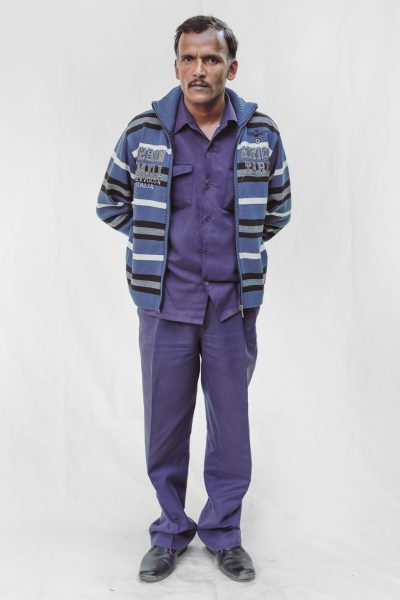
Delhi.
Kathait is a member of a cab drivers union that went on strike and shut down Uber and Ola services demanding higher fares, low commissions and better facilities for drivers. February 10, 2017.

Khumulwng, West Tripura, Tripura.
The Debbarmas travelled over 1,750 km to attend a protest by the Indigenous People’s Front of Tripura. Demands were raised to create a separate state of Tipraland for indigenous Tipris, to implement the National Register of Citizens while rejecting the Citizenship Amendment Act, and to resolve the longstanding Bru-Reang rehabilitation issue, among others.
December 02, 2019.

Howrah, West Bengal.
According to the couple, men related to the labour union leader of a jute mill where Shah was employed barged into their house while he was away at work, molested Devi and tried to rape her. The police initially refused to file a First Information Report on the incident that took place in February 2015, but later registered a case upon pressure from the media. Shah ended up losing his job, and the family was forced to flee to Delhi in September 2015. A man on the street guided them to Jantar Mantar, which became their new home. After moving here, the couple has had a child, a baby girl they have named Jantri. April 8, 2017.

Siahar, Ludhiana, Punjab.
Kaur had been sitting on protest at Jantar Mantar since January 2013, demanding punitive action against a high-ranking police officer from Punjab whom she accuses of raping and threatening to kill her. The incident happened in 2010, she says, when she approached the police in Sangrur, Punjab, seeking action against a man who hadn’t paid back the Rs. 40,000 (approx. USD 560) she loaned him.
A tent at Jantar Mantar became her home. In RTI requests, she even listed her address as Camp No. 7, Jantar Mantar. She later filed a petition in the Supreme Court challenging the National Green Tribunal’s orders to vacate Jantar Mantar. “I will die, but I will not leave Jantar Mantar until I am given justice,” she told the media.
April 7, 2017.

Lakhanguwan, Chhatarpur, Madhya Pradesh.
Dubey, a merchant, came to Delhi on some other work, but when he figured that he’s got a few hours before his train, came to Jantar Mantar to protest against the agents at the local Aadhaar biometric enrollment centre in his village charging people anywhere between Rs.100 (approx USD 1.4) to 200 (approx USD 2.8). January 21, 2017.

Barrackpore, North 24 Paraganas, West Bengal.
Agarwal was at a sit-in organised by the All India Fair Price Shop Dealers Federation, which demanded better margins for grains, pulses and other food items supplied through the subsidised Public Distribution System, so as to ensure a guaranteed minimum monthly income. December 2, 2019.

Delhi.
A social activist, Singh, decried a plan to replace the statue of freedom fighter Chandra Shekhar Azad in Bhopal with that of former Chief Minister Arjun Singh. December 2, 2019.



